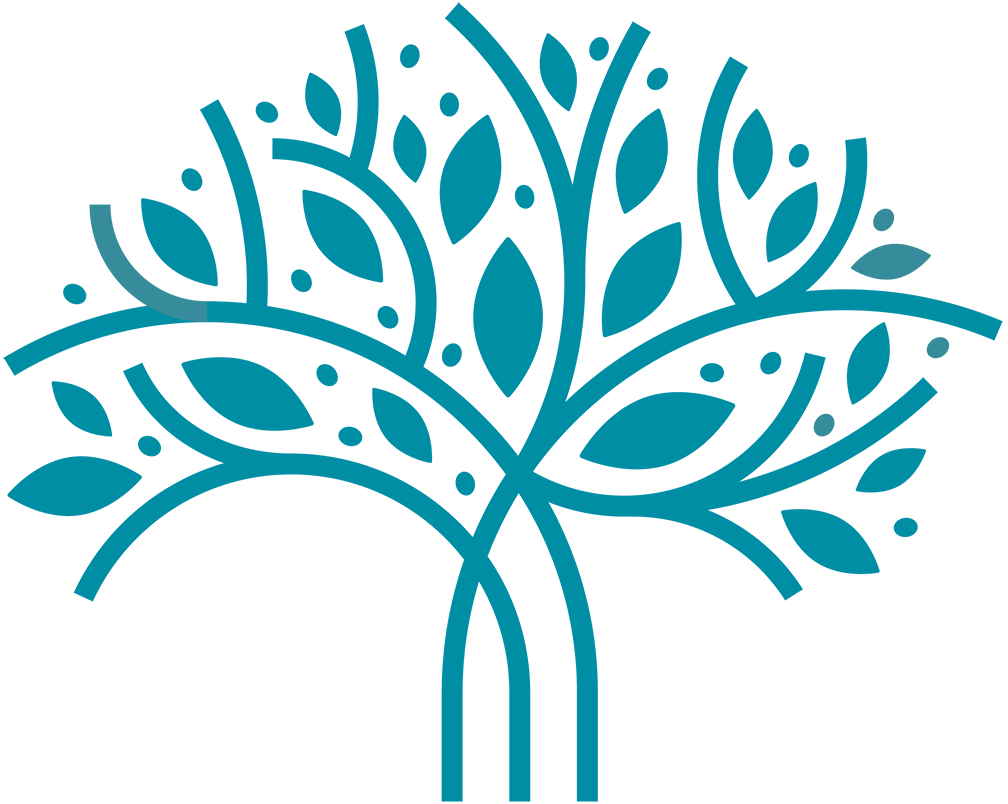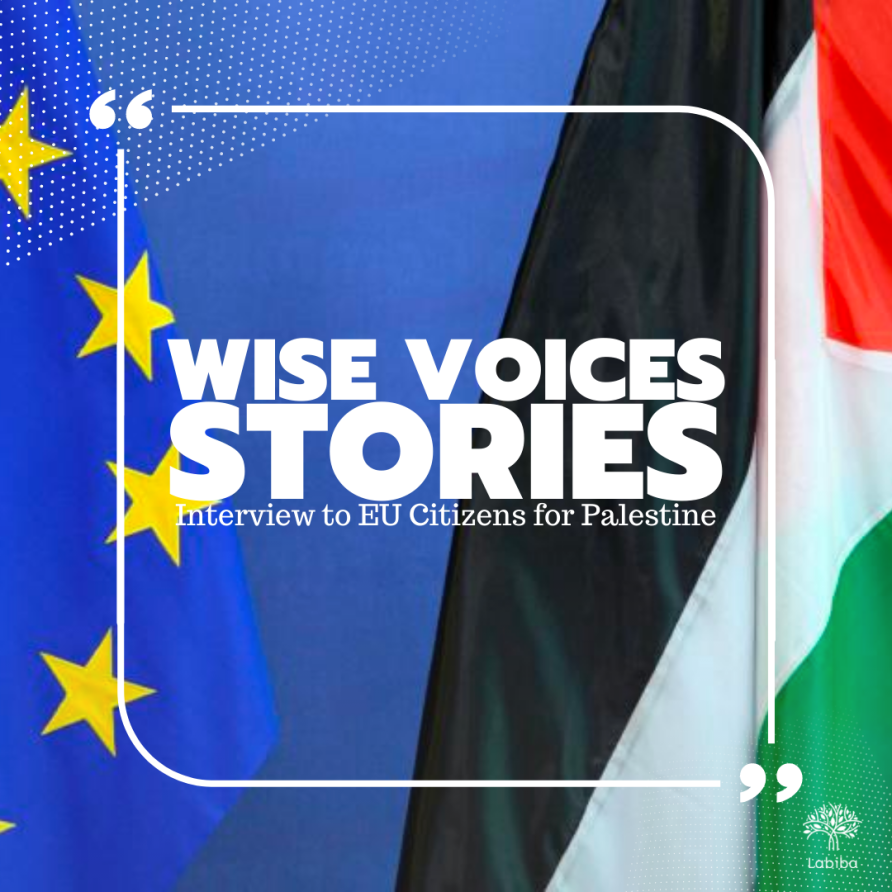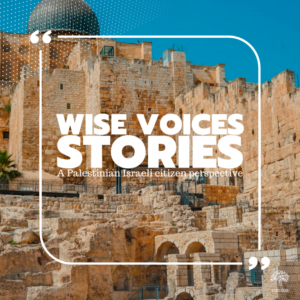Wise voices is a column that aims at portraying Palestine through the stories of experts, organisations and activists living on the ground. Our goal is to give a voice to those who get in touch and deal with the Palestinian reality on a daily basis.
The EU Citizens for Palestine is an informal group based all over Europe. Its goal is to advocate and raise awareness of the role of European institutions on the Palestinian situation.
Would you like to tell us something about yourselves and your academic journey?
EU Citizens for Palestine (EUC4P) is a coalition currently composed by three members: Mafalda, Angela Hadil, and Fabio.
We are three human rights defenders in our late 20s based in Portugal and Italy. Mafalda, Portuguese working for the ODIHR in the OSCE, and Angela, Italian-Palestinian legal fellow working at MENA Rights Group, have both a legal background. Fabio, Italian working as coordinator at an European NGO, has an academic background in political science. We all share a deep engagement in the Palestinian question for different, personal reasons. We met each other during our Master in Human Rights and Democratization in Venice.
How was the project born?
Our project was born out of a petition. The western news and society were worried about tensions between Israel and Hamas, which broke out as a consequence of the Israel Occupation Forces’ violence towards Palestinians. Mafalda had just wrote an essay regarding the role of the EU in the Palestinian question; she found out that the EU is actually crucial to Israel but does not do anything to stop its human rights’ violations. She was very angry at its inaction and shared it with people from our Master, who got together and started the petition as a means to pressure the EU.
Your projects target Eu Institutions. Can you describe how Eu institutions are tackling the palestinian situation? Which countries in Europe took a step forward in recognising Israel’s human rights violations?
When it comes to the Palestinian question, the EU position has always been the same: supporting a peace process between Palestine and Israel in order to reach a “two-state solution”. Notwithstanding the fact that a two-state solution is not fair for Palestinians, we are confident in saying that EU institutions have done very little so far to contrast the blatant human rights violations, the ethnic cleansing, and constant actions of dispossession perpetrated by Israel against Palestinians. Lastly, the massacre of Palestinians in May 2021. As well as, the numerous reports by human rights organisations shedding light on Israeli violations (including strong allegations of war crimes), primarily the one from Human Rights Watch, have actually not stirred up the European ranks. Mere statements of condemnation and “raised eyebrows” by the EU institutions are not sufficient, whatsoever to end Israeli impunity.
Yet, it cannot be denied the strong role the EU could have in sustaining the Palestinian question. Indeed, under the Association Agreement, the EU is one of Israel’s main political and economic partners. By invoking the human rights clause embedded in such an agreement, as we asked in our petition, the EU could implement a pivotal tool to pressure and condemn Israel. However, besides some EU countries like Ireland, and some political groups, such as the Greens or the Left Group, being vocal on the Palestinian cause, no concrete action has been undertaken so far. This results in an unacceptable complicit silence.
You succeeded in drawing the attention of the European Parliament to the crimes and violations committed against the Palestinians. Why did you choose the petition instrument?
We assume that change is a process that entails a bottom-up approach. Signing a petition conveys this as it allows a popular demand to reach the policy-makers bureau. The petition we launched provided us with legitimacy through the signatures of more than 30.000 European residents that shared our vision and decided to echo our call for action. Not only this contributed in raising awareness on a European level of the human rights violations still happening in Palestine; it has also helped at urging – in an official way – a stronger position of our EU institutions.
What do you want to achieve with this petition? What is your current main goal?
This petition is important to raise awareness among EU citizens and residents on the fact that the EU remains Israel’s main trading partner while being an international entity based on the respect of human rights. We aspire to bind EU commercial trades with Israel (such as the EU-Israel Association Agreement) for the full respect of human rights in Palestine. Though we know perfectly that our petition will probably not change the situation in the foreseeable future, we think that support towards Palestine can be achieved only by undertaking concrete, small actions which might cause a stronger snowball effect.
We are currently following the development of our petition and we are determined in keeping high public attention on further developments.
Your group is made by international people, do you think that this affected your choice to target Eu institutions directly?
Undoubtedly, the fact that we, and all the people that helped us throughout these months, were placed in different EU countries (Portugal, Italy, Denmark, France, etc.) naturally brought us to address the EU institutions. This decision was also taken in order to pursue a more unitarian action. Addressing single governments with different political positions would have required the implementation of numerous strategies; it would have been difficult to uphold a more holistic and comprehensive approach. Moreover, we think that the pressure the EU can impose on Israel could be definitely stronger than the one of single states.
What are your plans for the future?
What can we say; we just started, therefore a lot is on our bucket list and a lot we still need to learn. Undoubtedly, we want to keep raising awareness among the EU citizens and residents and advocating for the Palestinian question on our social media, by creating Palestine-related content and collaborating with Palestinian activists and allies to Palestinians. Ideally, we would love to create events or workshops. We would also like to increase our network and improve our engagement with those that so passionately follow us. Alongside that, we are continuing our battle in pressuring the EU to take action.
We are monitoring the status of our petition, trying to get strategically in contact with MEPs, and keeping an eye on any Palestine-related discussion. Our ultimate dream would be to obtain the status of an international NGO and have an observatory role within the EU. Dreams are big, but so it is our determination and strong dedication to the Palestinian cause. We are just looking forward to what will come next!
The Israeli-Palestinian question polarises public opinion, as in the recent case of Emma Watson. Whoever claims to be in solidarity with a country that suffers constant violations is immediately stigmatized as anti-semitic. What is your response/attitude towards this instrumentalization of the anti-Semite as a threat and have you ever been accused of being it?
First of all, it is important to note that Arabs, such as Palestinians, are also Semite. As such, this argument does not make much sense. Secondly, the fact that Jews have indeed always suffered from discrimination is the only argument that the state of Israel has to prevent people from the United States of America and Europe from speaking and criticising the state of Israel and its constant human rights’ violations. It is an emotional argument, though, not a rational one. Perhaps that is why it is so effective: people refrain from speaking because they remember what happened in the Holocaust and carry that weight.
But we believe people are becoming more and more aware of the distinction between anti-semitism and anti-zionism. This is not a matter of religion but a matter of basic human rights. It is our opinion that zionism’s fragility started to be exposed with the Anti-Semitism criticism directed at Emma Watson. It is the only argument the state of Israel has, so it is the only card it can play to prevent the world from dismantling it – even if it means calling an anti-Semite someone who did not mention any religion but only expressed solidarity towards people. As with everyone else that stands for Palestine, we already received some unpleasant comments, but our consciences are clear.


